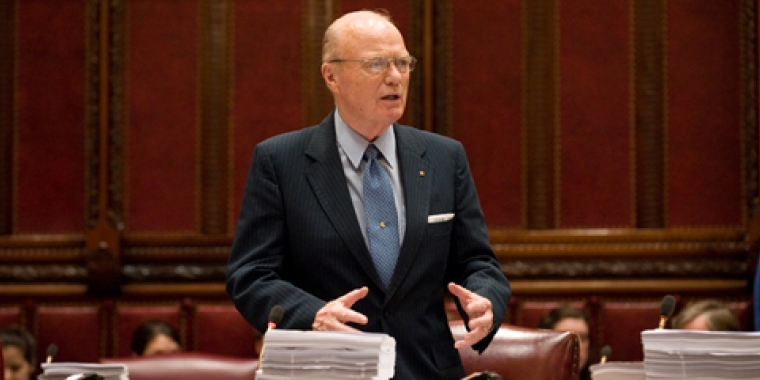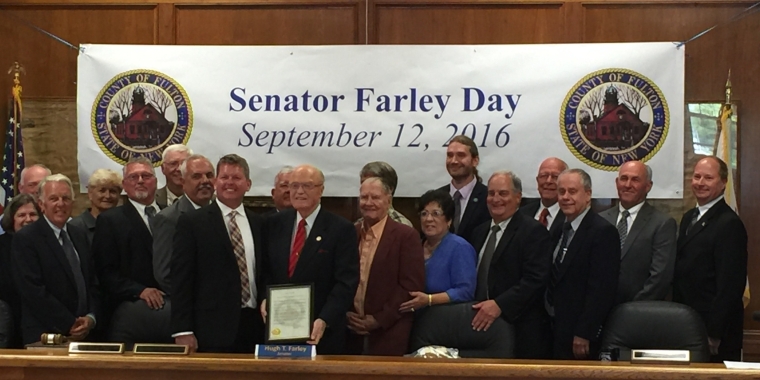
SEN. FARLEY AND FELLOW REPUBLICANS UNVEIL TAXPAYER EMPOWERMENT ACT

State Senator Hugh T. Farley (R, C, I - Schenectady), and his Republican colleagues in the Senate, today unveiled the "Taxpayer Empowerment Act" (TEA), a five-part program that addresses the root causes of New York’s fiscal and economic problems. Those problems specifically include spending too much and taxing too much.
The Senate Republican TEA program calls for enactment of a constitutional state spending cap; a school property tax cap; a ban on unfunded state mandates on local governments and school districts as well as eliminating unnecessary regulations that hold back businesses; requiring a two-thirds vote to increase state taxes; and Initiative and Referendum to give the people greater authority to change state laws.
On April 15th, thousands of people turned out for "tea parties" across New York to protest and voice their anger over skyrocketing taxes.
The Senate Taxpayer Empowerment Act (TEA) includes the following:
CONSTITUTIONAL SPENDING CAP - The Republican proposal would enact a constitutional spending cap that would limit year-to-year State spending increases to 120 percent of the Consumer Price Index (CPI) or 4 percent, whichever is less. This cap would force state government to live within its means. The Senate passed a spending cap amendment twice last year, with bipartisan support. The Assembly has not acted on spending cap legislation. Governor Paterson has introduced his own spending cap bill for consideration this year.
The spending cap would reduce state spending by $2.8 billion in the next fiscal year. In addition, had this constitutional amendment been in place the last five years, State taxpayers would have saved $13.1 billion, half of which would have been returned to taxpayers and the other half placed in a rainy day reserve fund.
PROPERTY TAX CAP – Last year, the Senate Republicans passed Governor Paterson’s school property tax cap bill that would place a cap on the growth of school property taxes at four percent or 120 percent of Consumer Price Index (CPI), whichever is less. The bill passed the Senate with bipartisan support, but was not acted on by the Democrat-controlled Assembly.
NO UNFUNDED MANDATES OR UNNECESSARY REGULATIONS – The Senate TEA plan takes a strong stand against unfunded state mandates on school districts and local governments, and would eliminate costly and often unnecessary state regulations that drive up costs for businesses and cost jobs.
Ban On Unfunded Mandates -- The ban on unfunded mandates would prevent the Legislature from imposing a mandate whose fiscal implications are greater than $10,000 to a municipality, or in excess of $1 million when combined statewide.
In addition, Senate Republicans have proposed and passed legislation to encourage local governments to consolidate or share services to reduce costs and ease the burden on property taxpayers.
Eliminate Unnecessary Regulations On Business – Governor Paterson’s Executive Order that all state agencies closely review the impact of mandates is a good step forward, but Senate Republicans go further by proposing the creation of a Regulatory Reform and Competitiveness Commission to review all state regulations for their impact on the state’s businesses.
The Commission would include representatives from the large and small business community, as well as local government and labor, and, similar to the Berger Commission, make a recommendation to the State Legislature of regulatory revisions that would become law, unless the State Legislature passed superseding legislation.
TWO-THIRDS MAJORITY VOTE TO INCREASE TAXES –
The TEA plan requires that any state tax increase must be approved by at least a two-thirds "supermajority" vote of each house to pass and be sent to the Governor for consideration.Sixteen states currently require either a supermajority vote or more than a simple majority to pass tax increases as a way to ensure that any tax increase is absolutely necessary and deserving of bipartisan support.
California requires a two-thirds Legislative vote to approve tax hikes. In 2004, Democrats there undertook a major campaign for a ballot proposal to repeal the two-thirds requirement. Voters defeated the ballot proposal and overwhelmingly supported keeping the supermajority vote requirement as a protection for taxpayers.
INITIATIVE AND REFERENDUM –
This proposal would amend the State Constitution to allow for direct initiative and referendum, whereby measures are placed on the ballot at the November general election for a popular vote after a certain number of signatures are collected. Twenty-seven states currently have some form of Initiative and Referendum.Under the Senate proposal, signatures from five percent of the total voters statewide in the last gubernatorial election would be required. To ensure that a measure has a broad base of statewide support, these signatures would be required to include at least 5,000 signatures of residents from at least three-fifths of the State's congressional districts.
Once on the ballot, an initiative or referendum would become law if it receives a majority of the votes cast. The bill also allows for initiative and referendum at the county, city, town or village level.
Just last week, voters in California used their right to place questions on the ballot to defeat five budget proposals that would have increased taxes, spending and borrowing
SENATE REPUBLICANS CALL FOR ACTION – "The people of New York have made it very clear that they are sick of high taxes and spending, they are tired of more mandates and regulations and they are voting with their feet," Senator Skelos said. "People are leaving, businesses are closing and moving to other states that are doing more to encourage economic growth and we are losing jobs every day, and it all comes back to the core problems.



